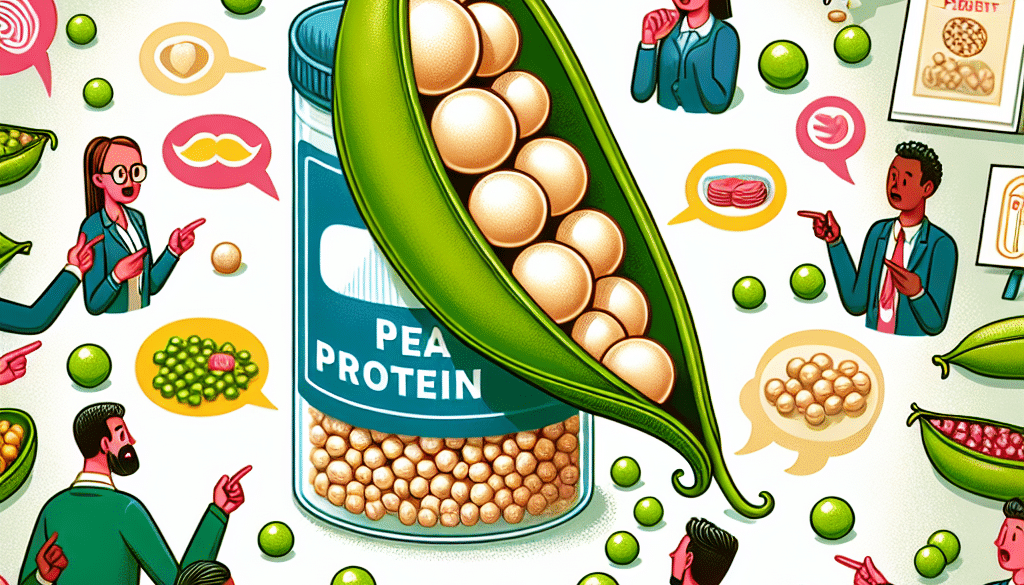What is the pea protein controversy?
-
Table of Contents
- Pea Protein Controversy: Unveiling the Debate
- Understanding Pea Protein
- The Nutritional Profile of Pea Protein
- The Controversy Surrounding Pea Protein
- Environmental Concerns
- Health Implications
- Ethical and Social Issues
- Case Studies and Examples
- Addressing the Concerns
- Benefits of Pea Protein
- Conclusion: Weighing the Pros and Cons
- Discover ETprotein’s High-Quality Protein Products
Pea Protein Controversy: Unveiling the Debate

Pea protein has emerged as a popular plant-based alternative to animal-derived proteins, particularly among vegans, vegetarians, and those with dietary restrictions. However, its rise in popularity has not been without controversy. This article delves into the various aspects of the pea protein debate, examining the concerns and benefits associated with this plant-based protein source.
Understanding Pea Protein
Pea protein is derived from yellow split peas and is a high-quality alternative to traditional protein sources. It contains all nine essential amino acids, making it a complete protein, which is crucial for muscle growth, repair, and overall health. Pea protein is also hypoallergenic, making it a suitable option for individuals with allergies to dairy, soy, or gluten.
The Nutritional Profile of Pea Protein
- Rich in branched-chain amino acids (BCAAs)
- High in iron and arginine
- Low in allergens
- Free from cholesterol and low in fat
The Controversy Surrounding Pea Protein
The controversy around pea protein primarily revolves around its environmental impact, potential health implications, and the ethics of its production. Critics argue that while pea protein is often marketed as a sustainable and eco-friendly option, there are several factors that complicate this narrative.
Environmental Concerns
One of the main arguments against pea protein is its environmental footprint. While peas require less water and fertilizer than other crops, the processing of peas into protein powder is energy-intensive. Additionally, the monoculture farming practices associated with pea cultivation can lead to soil depletion and reduced biodiversity.
Health Implications
Some health experts have raised concerns about the digestibility and absorption of pea protein. There are also debates about the presence of anti-nutrients, which can interfere with the absorption of minerals, and the use of hexane, a chemical solvent used in the extraction process of some pea protein powders.
Ethical and Social Issues
The sourcing of peas for protein production has also been scrutinized. Questions have been raised about the working conditions and fair compensation for farmers, as well as the impact on local communities and economies.
Case Studies and Examples
Several studies have compared the environmental impact of pea protein to other protein sources. For instance, a study by the University of Michigan found that pea protein production emits 86% fewer greenhouse gases than dairy protein production. However, other research points out that the benefits can be negated by the energy used during processing and transportation.
Addressing the Concerns
Manufacturers and stakeholders in the pea protein industry are taking steps to address these concerns. Efforts include improving agricultural practices, reducing energy consumption during processing, and ensuring ethical sourcing and fair labor practices.
Benefits of Pea Protein
Despite the controversy, pea protein offers several benefits that continue to attract consumers:
- It’s a sustainable alternative to animal-based proteins.
- It’s suitable for people with various dietary restrictions.
- It supports muscle growth and maintenance.
- It’s a non-GMO and often organic option.
Conclusion: Weighing the Pros and Cons
In conclusion, while pea protein is a promising plant-based protein source with numerous health benefits, it is not without its controversies. The debate centers around environmental, health, and ethical concerns. However, with ongoing improvements in production and sourcing practices, pea protein has the potential to be a truly sustainable and ethical protein choice for the future.
Discover ETprotein’s High-Quality Protein Products
If you’re looking for a reliable source of pea protein and other plant-based proteins, ETprotein offers a range of products that cater to various needs. Their commitment to quality, sustainability, and ethical practices makes them a top choice for consumers and businesses alike.
About ETprotein:
ETprotein, a reputable protein and L-(+)-Ergothioneine (EGT) Chinese factory manufacturer and supplier, is renowned for producing, stocking, exporting, and delivering the highest quality organic bulk vegan proteins and L-(+)-Ergothioneine. They include Organic rice protein, clear rice protein, pea protein, clear pea protein, watermelon seed protein, pumpkin seed protein, sunflower seed protein, mung bean protein, peanut protein, and L-(+)-Ergothioneine EGT Pharmaceutical grade, L-(+)-Ergothioneine EGT food grade, L-(+)-Ergothioneine EGT cosmetic grade, L-(+)-Ergothioneine EGT reference grade and L-(+)-Ergothioneine EGT standard. Their offerings, characterized by a neutral taste, non-GMO, allergen-free attributes, with L-(+)-Ergothioneine purity over 98%, 99%, cater to a diverse range of industries. They serve nutraceutical, pharmaceutical, cosmeceutical, veterinary, as well as food and beverage finished product distributors, traders, and manufacturers across Europe, USA, Canada, Australia, Thailand, Japan, Korea, Brazil, and Chile, among others.
ETprotein specialization includes exporting and delivering tailor-made protein powder and finished nutritional supplements. Their extensive product range covers sectors like Food and Beverage, Sports Nutrition, Weight Management, Dietary Supplements, Health and Wellness Products, and Infant Formula, ensuring comprehensive solutions to meet all your protein needs.
As a trusted company by leading global food and beverage brands and Fortune 500 companies, ETprotein reinforces China’s reputation in the global arena. For more information or to sample their products, please contact them and email sales(at)ETprotein.com today.












